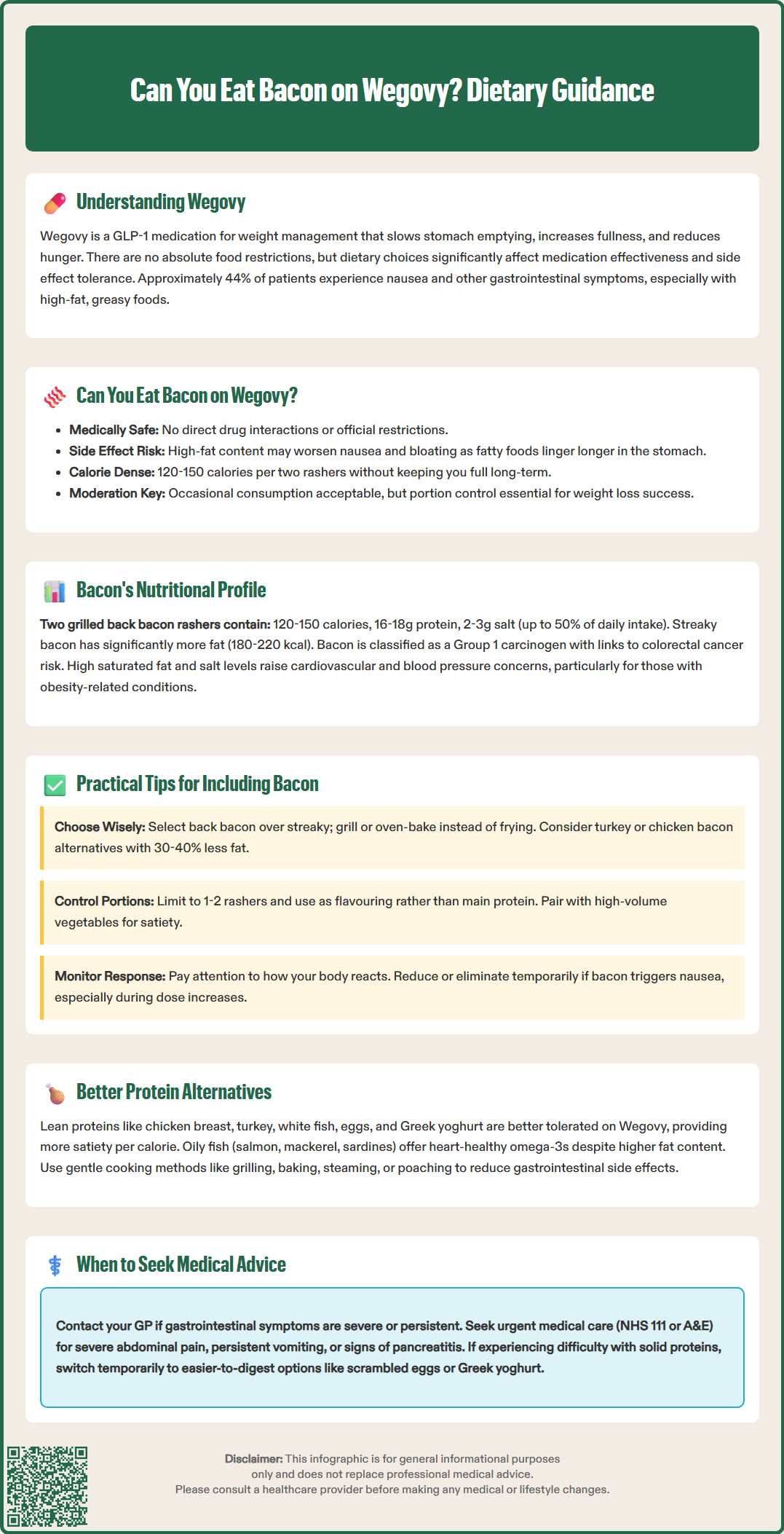
Can you eat bacon on Wegovy? This common question reflects broader concerns about dietary choices whilst taking semaglutide for weight management. Wegovy (semaglutide 2.4 mg) is a GLP-1 receptor agonist licensed by the MHRA for chronic weight management in adults with obesity or overweight with comorbidities. Whilst there are no absolute food restrictions with Wegovy, the medication slows gastric emptying and alters appetite regulation, meaning dietary choices significantly influence both treatment efficacy and tolerability. High-fat, processed foods like bacon may exacerbate common gastrointestinal side effects including nausea, which affects approximately 44% of patients. Understanding how to incorporate familiar foods sustainably supports long-term weight management success whilst minimising discomfort during treatment.
Quick Answer: Yes, you can eat bacon whilst taking Wegovy, as there are no medical contraindications, though moderation is advised due to its high fat and salt content which may worsen gastrointestinal side effects.

Mounjaro® is the most innovative GLP-1 medication proven to dramatically curb appetite, hunger, and cravings to help professional men achieve substantial weight loss.
Start Here
Wegovy® is a weekly injectable GLP-1 medication with proven effectiveness in reducing appetite, hunger, and cravings to help busy professionals lose significant weight.
Start HereWegovy (semaglutide 2.4 mg) is a glucagon-like peptide-1 (GLP-1) receptor agonist licensed by the MHRA for chronic weight management in adults with obesity (BMI ≥30 kg/m²) or overweight (BMI ≥27 kg/m²) with at least one weight-related comorbidity. The medication works by mimicking the naturally occurring hormone GLP-1, which regulates appetite and food intake through several mechanisms. According to the SmPC, semaglutide slows gastric emptying, enhances satiety signals to the brain, and reduces hunger, thereby helping patients consume fewer calories naturally.
When prescribed Wegovy, patients should receive comprehensive lifestyle intervention support alongside the medication. NICE guidance (TA875) emphasises that pharmacological treatment should be part of a multicomponent intervention including dietary modification, increased physical activity, and behavioural strategies. There are no absolute dietary restrictions with Wegovy—no specific foods are categorically forbidden—but the medication's mechanism means that dietary choices significantly influence both treatment efficacy and tolerability.
Many patients experience gastrointestinal side effects, particularly during dose escalation. Common adverse effects include nausea (occurring in approximately 44% of patients according to clinical trials), vomiting, diarrhoea, constipation, and abdominal discomfort. These effects are often exacerbated by high-fat, greasy, or heavily processed foods. Understanding how different foods interact with your body whilst taking Wegovy helps optimise weight loss outcomes and minimise uncomfortable side effects.
If you experience severe or persistent gastrointestinal symptoms, severe abdominal pain, or signs of dehydration, contact your GP or NHS 111 promptly, as these could indicate serious complications such as pancreatitis or gallbladder disease that require medical attention.
The question of whether you can eat bacon on Wegovy reflects broader concerns about incorporating familiar foods into a sustainable, long-term eating pattern that supports your weight management goals.

Yes, you can eat bacon whilst taking Wegovy—there is no medical contraindication or official restriction against consuming bacon or any other specific food during semaglutide treatment. Wegovy does not interact with bacon or require you to eliminate particular foods from your diet. However, the practical considerations around eating bacon whilst on this medication are more nuanced than a simple yes or no answer.
The key consideration is that bacon is a high-fat, processed meat, and such foods may worsen the gastrointestinal side effects commonly experienced with GLP-1 receptor agonists. NHS advice suggests that rich, spicy, or fatty foods can exacerbate nausea with these medications. Because Wegovy slows gastric emptying, fatty foods remain in the stomach longer, potentially intensifying feelings of nausea, bloating, or discomfort. Many patients report that foods they previously tolerated well—including bacon, fried foods, and rich meals—now trigger unpleasant symptoms. This is not a pharmacological interaction but rather a consequence of how the medication alters digestive processes.
From a weight management perspective, bacon can be incorporated into a calorie-controlled diet, but portion awareness is essential. Successful weight loss on Wegovy requires maintaining a caloric deficit, and energy-dense foods like bacon can quickly contribute significant calories without providing substantial satiety. Two rashers of back bacon contain approximately 120–150 calories and 8–10 grams of fat, whilst streaky bacon is even higher in fat content. It's worth checking nutrition labels, as values vary by brand and preparation method.
The practical answer is that bacon can be included occasionally and in moderation, particularly if you choose leaner cuts, control portion sizes, and monitor your individual tolerance. The NHS recommends limiting red and processed meat consumption for general health. If you find that bacon triggers nausea or other side effects, it may be wise to limit consumption or choose alternative protein sources during your treatment period.
Understanding bacon's nutritional composition helps inform decisions about its place in a weight management diet. A typical serving of two grilled back bacon rashers (approximately 60g) provides:
Energy: 120–150 kcal
Protein: 16–18g
Total fat: 8–10g (of which 3–4g saturated fat)
Carbohydrates: <1g
Salt: 2–3g (approximately 33–50% of the UK recommended maximum daily intake of 6g)
Vitamins and minerals: B vitamins (particularly B12, niacin, thiamine), selenium, phosphorus, and zinc
Streaky bacon contains significantly more fat—often 12–15g per two-rasher serving—with correspondingly higher calorie content (180–220 kcal). Note that nutrient content varies by cut, curing method, and brand.
The high saturated fat and salt content are the primary nutritional concerns. The Scientific Advisory Committee on Nutrition (SACN) advises that excessive saturated fat intake is associated with increased cardiovascular risk, whilst high salt consumption may elevate blood pressure—considerations particularly relevant for individuals with obesity-related comorbidities.
From a weight management perspective, bacon's protein content is beneficial for satiety and muscle preservation during weight loss. However, the calorie density means that bacon provides relatively few calories' worth of fullness compared to lean proteins or high-fibre foods. Processed meats, including bacon, are classified as Group 1 carcinogens by the International Agency for Research on Cancer (IARC), with regular consumption linked to increased colorectal cancer risk. The World Cancer Research Fund recommends limiting processed meat intake for cancer prevention.
For patients taking Wegovy, the medication itself promotes satiety, meaning you may naturally feel satisfied with smaller portions. This can work in your favour—a single rasher of bacon might provide the flavour satisfaction you seek without excessive calorie intake. However, the high fat content may trigger or worsen nausea, particularly during the initial months of treatment when gastrointestinal side effects are most pronounced.
If you wish to include bacon whilst taking Wegovy, several strategies can help you do so in a way that supports your weight loss goals and minimises side effects:
Choose leaner cuts and preparation methods:
Opt for back bacon rather than streaky bacon, as it contains less fat
Grill or oven-bake bacon rather than frying to reduce added fat
Trim visible fat before cooking
Blot cooked bacon with kitchen paper to remove excess grease
Consider turkey or chicken bacon alternatives, which typically contain 30–40% less fat (but check salt content, which may still be high)
Practice portion control:
Limit servings to 1–2 rashers rather than larger portions
Use bacon as a flavouring ingredient rather than the main protein (e.g., crumbled into salads or soups)
Pair bacon with high-volume, low-calorie foods like vegetables to create satisfying meals without excessive calories
Follow NHS advice for managing nausea:
Eat smaller, more frequent meals rather than large portions
Choose low-fat options when possible
Avoid rich, spicy, or heavily seasoned foods
Stay well hydrated by sipping fluids throughout the day
Eat slowly and mindfully, stopping if you experience discomfort
Balance your overall dietary pattern:
If you include bacon at one meal, choose leaner proteins for other meals that day
Ensure your diet emphasises whole foods—vegetables, fruits, whole grains, and lean proteins—with processed meats as occasional additions
Monitor your salt intake across the day, as bacon contributes substantially to the UK recommended maximum of 6g per day
Listen to your body's signals. If bacon consistently triggers nausea, bloating, or other discomfort, it may be worth reducing frequency or eliminating it temporarily, particularly during dose escalation phases. You can always reintroduce it later once you've adjusted to your maintenance dose.
If you experience persistent vomiting (especially if unable to keep fluids down), severe abdominal pain, or signs of dehydration, contact your GP or NHS 111 promptly.
Whilst bacon can be included occasionally, diversifying your protein sources supports both weight loss success and overall nutritional quality. Lean protein options are generally better tolerated on Wegovy and provide more satiety per calorie, helping you feel fuller whilst maintaining a caloric deficit.
Excellent lean protein alternatives include:
Chicken breast: Approximately 165 kcal and 31g protein per 100g cooked, with minimal fat
Turkey breast: Similar nutritional profile to chicken, with high protein and low fat content
White fish (cod, haddock, plaice): Very lean, typically 80–100 kcal per 100g with 18–20g protein
Eggs: Versatile and nutrient-dense, providing approximately 78 kcal and 6.5g protein per medium egg (58g)
Greek yoghurt: High-protein dairy option (10g protein per 100g) that many patients tolerate well
Legumes (lentils, chickpeas, beans): Provide protein plus fibre, enhancing satiety and supporting digestive health
Tofu and tempeh: Plant-based proteins suitable for varied dietary preferences
Oily fish such as salmon, mackerel, and sardines contain more fat than white fish but provide beneficial omega-3 fatty acids that support cardiovascular health. Most patients tolerate these better than processed meats, though portion awareness remains important.
When selecting proteins whilst taking Wegovy, prioritise options that are minimally processed, lower in saturated fat, and prepared using gentle cooking methods (grilling, baking, steaming, or poaching rather than frying). These choices typically cause fewer gastrointestinal symptoms whilst providing the nutrients necessary for maintaining muscle mass during weight loss.
If you experience persistent nausea or difficulty tolerating solid proteins, consider temporarily focusing on easier-to-digest options like scrambled eggs, smooth Greek yoghurt, or protein-enriched soups. Maintaining adequate protein and fluid intake is important, especially during dose escalation.
Contact your GP or prescribing clinician if gastrointestinal symptoms are severe, persistent, or interfering with adequate nutrition, as dose adjustment may be appropriate. Seek urgent medical attention (NHS 111 or A&E) if you experience severe abdominal pain, persistent vomiting (especially if unable to keep fluids down), or symptoms suggestive of pancreatitis or gallbladder disease, as these require prompt evaluation.
No, Wegovy does not medically restrict bacon consumption, but high-fat foods may worsen gastrointestinal side effects such as nausea and bloating. Moderation and choosing leaner cuts can help minimise discomfort whilst supporting weight management goals.
Lean proteins such as chicken breast, turkey, white fish, eggs, and Greek yoghurt are generally better tolerated on Wegovy and provide more satiety per calorie. These options contain less saturated fat and are less likely to trigger gastrointestinal symptoms.
Limiting bacon to 1–2 rashers occasionally, choosing back bacon over streaky bacon, and grilling rather than frying helps incorporate it into a balanced diet. Monitor your individual tolerance, as high-fat foods may worsen nausea, particularly during dose escalation.
All medical content on this blog is created based on reputable, evidence-based sources and reviewed regularly for accuracy and relevance. While we strive to keep content up to date with the latest research and clinical guidelines, it is intended for general informational purposes only.
DisclaimerThis content is not a substitute for professional medical advice, diagnosis, or treatment. Always consult a qualified healthcare professional with any medical questions or concerns. Use of the information is at your own risk, and we are not responsible for any consequences resulting from its use.